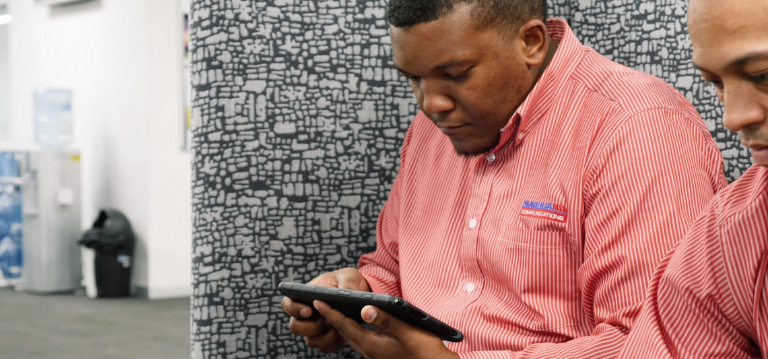Having recently achieved a new B-BBEE rating, we explain what it means to us here at Nashua Communications to empower our employees and the broader community.
We recently received a level two B-BBEE (Broad-based Black Economic Empowerment) certification. This form of economic empowerment was initiated by the South African government in response to criticism that the empowerment instituted during 2003/2004 was too narrow-based. Out of the eight levels, level one is the highest a company can achieve.
We’re very proud to have achieved this new rating, not only because it boosts the company from an ICT business perspective and ensures that we adhere to South African legislation, but because it allows us to empower the community.
We spoke to our HR Executive, Octavia Blose about this achievement and the exciting learnership programmes we offer. But before we elaborate on that, let’s take a look at how the B-BBEE scoring works and how we performed.
B-BBEE consists of five pillars that companies are measured and scored by:
1. Ownership:
This measures the percentage of shares in the business owned by black people. At Nashua Communications, black ownership is currently at 39.30%, with black women ownership at 31.77%.
2. Management Control:
This measures how much of the voting rights of the board, control of the executive board and percentage of senior management are held by black members. We scored 15.99 out of a target score of 23.00.
3. Skills Development:
This measures the amount of money that is invested by a company on training its black workforce. We scored 17.52, putting us on track to meet our target of 20.00.
4. Enterprise and Supplier Development:
This measures the scores of a company’s suppliers. The more empowered your suppliers are, the more points your own business will earn. It also measures a company’s expenditure on helping other black owned enterprises to grow. We scored above our target of 50.00 with a result of 50.89.
5. Socio-Economic Development:
It measures a company’s investment in charitable organisations. We’re right on par with our target score of 12.00.
Power to our people
All these pillars serve to boost the economy, assist the country, and boost our employees, which is important to us as we want to ensure that we equip them with the right skills, both for them and for our business. We accomplish this by giving our employees the first option to apply for other, higher positions within the company so that they can advance their careers and be promoted. We also provide our permanent workforce with learnership opportunities for skills development, such as a 12-month project management programme.
Community outreach and learnership
Beyond helping our own employees, we also assists the community at large in several ways. Every year, we help schools by providing bursaries to learners to further their studies. As part of this year’s Mandela Day initiative, we provided sanitary pads to some primary schools. Last year, we donated non-perishable food to a local school. We always look at what we can do to provide the most assistance.
With approximately 6.2 million South Africans currently without jobs, and Statistics South Africa placing the unemployment rate at 27.5% - which has increased from 27.2% four months ago – in their recently published Quarterly Labour Force Survey, we focus on helping the unemployed too. Our learnership programme for the unemployed gives those without work the opportunity to undergo various educational programmes, such as call centre training. We have also partnered with Torque IT, which enabled unemployed learners to undergo Microsoft’s MCSA Office 365 certifications. Apart from the call centre learning programme and Microsoft training, some of our other learning programmes for the unemployed include business administration and project management.
We offer bursaries to and recruit unemployed candidates for our learnership programmes through Reunert College. They put us in touch with students who aren’t employed yet and we place them in 12-month learnership programmes with the goal of ultimately employing them or giving them the real world skills they need to excel.
These learnership programmes are important to us as we want to develop young people to be the great leaders in future. It is also an important way to contribute to the economy.
Disabilities training
We work with various institutions to try and find people with disabilities. We normally approach these institutions and ask if they’re aware of anyone who would like to attend our learnership programmes. After receiving candidate C.V.’s and screening their C.V.’s, we conduct interviews and then place them in suitable learnership programmes.
We don’t just provide learnership for the sake of providing learnership. We usually work with our own management to determine which skills are needed in the business. They decide which learnerships we have to focus on, whether it’s sales, Microsoft, Unify or project management.
Going forward, we will expand this to internships as well.
Success stories
We have several success stories sprouting from our learnership programmes which we’re honored to share with you:
Benilde Muxanga came to us through Reunert College. She had never worked before, let alone in the corporate world. And whenever she had to speak, she was extremely nervous, in fact, when she started with us, she was stuttering. We placed her and other students in a 12-month programme after which she was appointed at Nashua Communications in the finance department as a junior. She didn’t know the difference between debit and credit, but she has since become a wonderful asset to the business as a credit controller. Now she isn’t afraid to stand up in front of people and share information.
“In the Nashua Communications learnership programme I learnt how to be a leader not a follower, this programme showed me the difference between being a strong person who can lead and a follower thinking you are a leader.” - Benilde Muxanga, Credit controller
Thato Raliteng also came from Reunert College on a leadership programme and within a few months, he started at Nashua Communications because we spotted his potential. On his very first project, Thato was a little overwhelmed but he took the advice given to him from his supervisors as well as observed and learnt from them, and he completed the project with confidence. Right now he is working in the technology department as a Solutions Architect.
“I was fortunate enough to get first-hand experience in the Nashua Communications Learnership programme and learned valuable lessons which I can use in my career. One lesson that really stuck with me was the many different types of jobs an engineer has to perform and the different types of roles and responsibilities I will be able to take on in the future” - Thato Raliteng, Solutions Architect
Terrence Mogale, started working for us as a Business Administrator but had aspirations to move into the Finance and Accounting department. We offered him a chance to grow his skills through a 12-month learnership programme and after showing great initiative, was appointed him to the finance department. He’s has since become a brilliant asset to the business, and was recently promoted and will take over a key role in April next year.
“During my Learnership programme with Nashua Communications, I learnt about people and teamwork, how to work with different characters and the best way to produce results from a team environment. This knowledge drove me to take ownership of my work and that learning helped me get permanent employment with Nashua Communications.” - Terrence Mogale, Accounting and Control Administrator
How to apply for a Nashua Communications learnership
If you or someone you know would also be interested in undergoing a Nashua learnership programme, send your CV to octavia.blose@nashua-communications.com.
If you would like to find out more about our communications offerings and start working with us. Contact us today.





